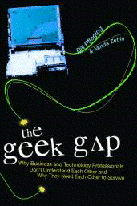The Inscrutable Future
The new novel, Spook Country, is set in the recent past.
There would be nothing unusual about that, except that its author is William Gibson, who, for more than 20 years, has made his living and his reptuation writing books about the near future. Gibson is most famous for inventing the cyberpunk movement and the term "cyberspace."
Why the switch? In part, Gibson told Silicon.com, because the future is getting too hard to see. "The trouble is there are enough crazy factors and wild cards on the table now that I can't convince myself of where a future might be in 10 to 15 years," he said. He also expressed sympathy for those in what he terms "corporate futurism," by which I think he means suits charged with making decisions today based on their analysis of what might happen tomorrow.
Pity me: I'm in that position myself. One of my roles in life is as board member of the American Society of Journalists and Authors (ASJA), an association of freelance writers and book authors which next year celebrates its 60th anniversary. The board decided it was time for some long-range planning, so I foolishly volunteered to chair a task force devoted to peering into the future and recommending plans for our next five years.
If there's one thing we know about the next five years, it's that we writers don't know how they will affect how we do what we do. Twelve years ago, getting paid regularly for writing for Web sites was an near-unheard-of activity. Eight years ago, those of us writing for the Internet had more offers of work than we knew what to do with. Neither of those things is true any more.
Around then, I wrote a big article for now-defunct Office.com about search engine optimization. By which I meant, Yahoo, Lycos, Alta Vista. There was no such thing as Google. Now Google is how I find everything, not to mention how I get my e-mail, which might as easily by on my handheld or my mobile phone as on an actual computer.
Six or seven years ago, there was practically no such thing as offshore outsourcing. Now, competition from India in particular is no longer just a concern for the poor unfortunate geeks, they're coming after our jobs as well. The Web daily Pasadena Now made news in May when it announced plans to have journalists in India watch Pasadena's government meetings streamed over the Internet and then write news reports about them. The publisher says he's hired two reporters to write 15 articles a week, each, at a total annual cost of $20,800. That's less than $14 per article, even if he gives his new reporters two weeks of paid vacation.
That's a very scary number for anyone who makes her living by writing.
Then there's InDesign, which some writers report they're expected to know how to use, so they can do their own production work, and Internet streaming video, which some Web sites are using to supplement their print articles, and which the writers are supposed to know about too. Not to mention blogging, which more and more writers I know are paid to do, another thing that was on no one's radar a few years ago...and...
Help! How the heck do we figure out what the future will look like for writers? And will it be a pretty picture if we do?
Here's what Gibson has to say: "Most societal change now is technologically driven, so there's no way to look at where the human universe is going without looking at the effect of emergent technology. There's not really anything else driving change in the world, I believe." Since World War II, he adds, technological change has been growing exponentially, to the current "vertigo," where now we can't have any idea what's going to happen next.
Yup. Things are changing too fast for anyone to foresee. And we can blame it all on the geeks.
There would be nothing unusual about that, except that its author is William Gibson, who, for more than 20 years, has made his living and his reptuation writing books about the near future. Gibson is most famous for inventing the cyberpunk movement and the term "cyberspace."
Why the switch? In part, Gibson told Silicon.com, because the future is getting too hard to see. "The trouble is there are enough crazy factors and wild cards on the table now that I can't convince myself of where a future might be in 10 to 15 years," he said. He also expressed sympathy for those in what he terms "corporate futurism," by which I think he means suits charged with making decisions today based on their analysis of what might happen tomorrow.
Pity me: I'm in that position myself. One of my roles in life is as board member of the American Society of Journalists and Authors (ASJA), an association of freelance writers and book authors which next year celebrates its 60th anniversary. The board decided it was time for some long-range planning, so I foolishly volunteered to chair a task force devoted to peering into the future and recommending plans for our next five years.
If there's one thing we know about the next five years, it's that we writers don't know how they will affect how we do what we do. Twelve years ago, getting paid regularly for writing for Web sites was an near-unheard-of activity. Eight years ago, those of us writing for the Internet had more offers of work than we knew what to do with. Neither of those things is true any more.
Around then, I wrote a big article for now-defunct Office.com about search engine optimization. By which I meant, Yahoo, Lycos, Alta Vista. There was no such thing as Google. Now Google is how I find everything, not to mention how I get my e-mail, which might as easily by on my handheld or my mobile phone as on an actual computer.
Six or seven years ago, there was practically no such thing as offshore outsourcing. Now, competition from India in particular is no longer just a concern for the poor unfortunate geeks, they're coming after our jobs as well. The Web daily Pasadena Now made news in May when it announced plans to have journalists in India watch Pasadena's government meetings streamed over the Internet and then write news reports about them. The publisher says he's hired two reporters to write 15 articles a week, each, at a total annual cost of $20,800. That's less than $14 per article, even if he gives his new reporters two weeks of paid vacation.
That's a very scary number for anyone who makes her living by writing.
Then there's InDesign, which some writers report they're expected to know how to use, so they can do their own production work, and Internet streaming video, which some Web sites are using to supplement their print articles, and which the writers are supposed to know about too. Not to mention blogging, which more and more writers I know are paid to do, another thing that was on no one's radar a few years ago...and...
Help! How the heck do we figure out what the future will look like for writers? And will it be a pretty picture if we do?
Here's what Gibson has to say: "Most societal change now is technologically driven, so there's no way to look at where the human universe is going without looking at the effect of emergent technology. There's not really anything else driving change in the world, I believe." Since World War II, he adds, technological change has been growing exponentially, to the current "vertigo," where now we can't have any idea what's going to happen next.
Yup. Things are changing too fast for anyone to foresee. And we can blame it all on the geeks.



0 Comments:
Post a Comment
Subscribe to Post Comments [Atom]
<< Home